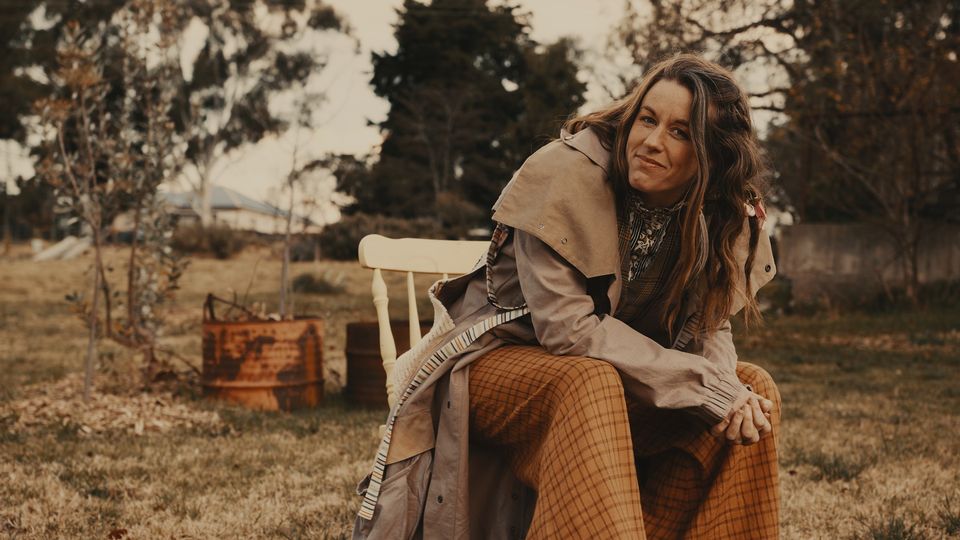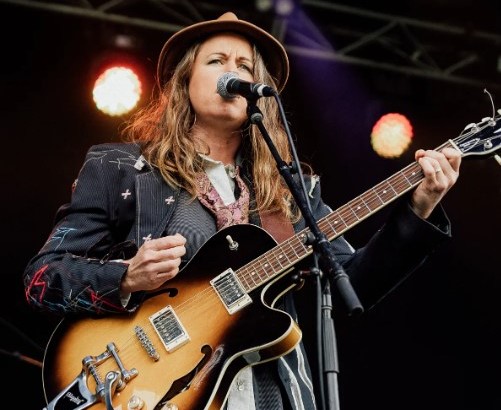
Singer-songwriter Robyn Martin’s journey from Ceduna in South Australia to Candelo is reflected through song and story on her debut solo album Milk and Honey. Photo: Robyn Martin.
Candelo singer-songwriter Robyn Martin has embarked on a journey of, at times, faltering introspection through her debut solo album Milk and Honey, released last year and now a cornerstone of her current touring schedule.
Growing up on her family’s fifth-generation farm in rural Ceduna – on the fringes of the Nullabor Plain – Robyn was deeply immersed in the rhythms of agricultural life but also exposed to the complex colonial history of the land.
These formative experiences would come to shape both her music and her evolving sense of identity.
After stints in larger Australian towns like Lismore, Robyn found a sense of community and place in the hamlet of Candelo, snuggled in the Bega Valley on the NSW South Coast.
There, in the 1970s, a sanctuary called Cowsnest Community Farm welcomed creative souls from far and wide – operating in the style of a kibbutz where people could offer their labour in return for board and lodging.
Acting as a refuge for animals and humans, where staff and volunteers were encouraged to explore their full potential and to discover the value and meaning behind community, conservation and education, farm work by days gave way to artistic flights of fancy by night and, by 1985, had given root to the Candelo Arts Society.
A town with a history of colonial settlement dating back to the 1830s deeply steeped in agriculture and now vibing on arts, Candelo’s real story is told by three distinctive mountains in the area – Gulaga (Mt Dromedary, the first mountain in Australia named by Captain James Cook in 1770), Biamanga (Mumbulla Mountain), and Balawan (Mt Imlay).
The landscape is rich with history and ancient dreaming trails. All that lies between these three mountains played important roles in local Aboriginal ceremonies of initiation, storytelling, and teachings about the land of the Djiranganj people of the Yuin Nation.
It was here, surrounded by like-minded musicians, that Robyn felt right at home and began honing her craft in earnest.
She says she wrote songs privately most of her life but lacked the confidence to share them until joining an all-female trio – alongside Melanie Horsnell and Kate Burke – called The New Graces.
Their first album Seasons was released in 2020 and charted at number one on the ARIA Australian Country Album charts and number one on the Australian Independent Records (AIR) chart.
Their continuing collaborations gave Robyn the courage to record Milk and Honey.
Working closely with producer David Ross Macdonald (The Waifs) and other local world-class talents over intensive weeks-long sessions, she immersed herself in discovering her authentic sound.

Robyn, a self-described introvert, says baring her soul through live performance requires vulnerability. Photo: Robyn Martin.
“I think in some ways, I didn’t really know what to expect when I started this project, I didn’t really know what my sound was because I’ve always contributed to other people’s sounds,” she said, “so to shift to doing my own stuff. It’s like, oh, okay, well, it’s a blank canvas. Which direction do I want to go?”
Crucial to Robyn’s evolving perspective was her collaboration with the Djinama Yilaga, a renowned choir made up of South Coast Yuin people, who are reclaiming their ancestors’ language, Dhurga, through song.
“Being around them and hearing their stories has definitely been a massive influence on me personally in my life and in my music,” she said.
Robyn has always grappled with reconciling her identity as a white Australian.
“I’ve been really lucky in my life to have opportunities arise where I’ve been able to connect with a lot of amazing First Nations people but I’ve also struggled coming to terms with my sense of belonging in this place, as a white Australian and how we reconcile our relationship with land and the First Nations people here,” she explained.
Djinama Yilaga’s backing vocals and language samples helped shape how Robyn reconciled her unease, the title track strikingly tackling the complexities of Australia’s history with a call to face up to and own the history, letting go of white privilege and a call to connection.
Milk and Honey – the album – a blend of country, soul, and lyrical nods to her South Coast homeland is one that Robyn dubs “South Coast Country Soul”.
A sound that is distinctly Australian, her music traverses a wide terrain from deep pocket soul, mixed with heart-warming, thought-provoking folk sensibilities, to the occasional banjo driven hoedown singalong and a sprinkle of grungy angst rock.
Now, for Robyn, a self-described introvert, baring her soul through live performance requires vulnerability.
“It’s stepped me well out of my comfort zone, putting myself out into the world in that way is super daunting and scary,” she said, “but I’m so grateful for that experience and playing my songs to people is a huge honour.”
Original Article published by Edwina Mason on About Regional.












